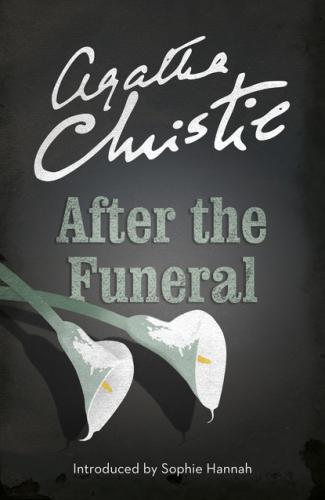Agatha Christie
AFTER
THE
FUNERAL
Copyright
Published by HarperCollinsPublishers Ltd
1 London Bridge Street
London SE1 9GF
First published in Great Britain by
Collins 1953
Copyright © 1953 Agatha Christie Ltd.
All rights reserved.
The moral right of the author is asserted
All rights reserved. This book is sold subject to the condition that it shall not, by way of trade or otherwise, be lent, re-sold, hired out or otherwise circulated without the publisher’s prior consent. No part of this text may be reproduced, transmitted, downloaded, reverse engineered, or stored in or introduced into any information storage and retrieval system, in any form or by any means whether electronic or mechanical, now known or hereinafter invented, without the express written permission of HarperCollins ebooks.
HarperCollinsPublishers has made every reasonable effort to ensure that any picture content and written content in this ebook has been included or removed in accordance with the contractual and technological constraints in operation at the time of publication
Source ISBN: 9780007562695
Ebook Edition 2010 ISBN: 9780007422128
Version: 2019-01-07
For James
in memory of happy days
at Abney
Contents
Copyright
After the Funeral: An introduction by Sophie Hannah
Chapter 1
Chapter 2
Chapter 3
Chapter 4
Chapter 5
Chapter 6
Chapter 7
Chapter 8
Chapter 9
Chapter 10
Chapter 11
Chapter 12
Chapter 13
Chapter 14
Chapter 15
Chapter 16
Chapter 17
Chapter 18
Chapter 19
Chapter 20
Chapter 21
Chapter 22
Chapter 23
Chapter 24
Chapter 25
E-book Extra: The Poirots
About Agatha Christie
The Agatha Christie Collection
After the Funeral: An Introduction by Sophie Hannah
In a poll conducted by the Crime Writers’ Association in November 2013 to celebrate its sixtieth anniversary, Agatha Christie was voted ‘Best Ever Author’. Any other result would, frankly, have been rather a joke. Christie’s novels have sold more than two billion copies in 109 languages (and probably more). Her play The Mousetrap has been delighting audiences in the West End for over 60 years. It would be fair to say, I think, that no other crime novelist comes close to matching her achievement. For me, as a psychological thriller writer, Agatha Christie is and will always be the gold standard—a lifelong inspiration whose every inventive tale demonstrates exactly how it should be done. It was Christie who made me fall in love with mystery stories at the age of twelve and, rereading her work now at the age of 42, I still believe that she cranks up the excitement and the intellectual puzzlement like no other.
In the ‘Best Ever Novel’ category of the Crime Writers’ Association poll, Christie won again, with a story that many of her fans believe to be her best: The Murder of Roger Ackroyd. Indeed, it is a deserving winner for the boldness of its solution. Interestingly, the most popular Christie novels tend to be the ones with the high-concept seemingly-impossible- yet-possible solutions, the ones that take your breath away: The Murder of Roger Ackroyd, And Then There Were None, Murder on the Orient Express. It’s easy to see why this might be. Christie, when conceiving these stories, gave her readers exactly what they wanted: the best story possible, the one most likely to elicit gasps of shock and astonishment when the genius solution is revealed at the end.
Sensibly, Christie didn’t give a damn about the tedious consideration of ‘Come on, how likely is this to happen, really?’ So long as it could happen in theory—as long as no law of science made it impossible—then she quite rightly deemed it to be plausible, and therefore acceptable fodder for fiction. She would, I suspect, have little sympathy for those contemporary readers who determinedly misunderstand the word ‘plausible’ and use it as if it were synonymous with ‘commonplace’, ‘everyday’ or ‘has happened to several people I know personally’.
I say ‘contemporary readers’ because I think our expectations of novels have changed. While Christie was alive and writing, my impression is that most readers of crime fiction shared her philosophy of ‘above all else, tell the most exciting story that you can’. Now, however, a far greater value is placed upon what many insist on calling ‘plausibility’ but what is in fact a worrying lack of imagination seeking to curtail the imaginations of others. Many, for example, might feel uncomfortable with a super-clever detective like Hercule Poirot, who always gets the right answer and proves himself over and over again to be a man of unparalleled genius. Some—having met no unparalleled geniuses themselves and therefore finding them impossible to believe in—might say, ‘No, this is not realistic—can’t you have the detective being a bit more ordinary in his capabilities, and maybe solving the case by… oh, I don’t know, maybe putting some fingerprints into the database and finding a match?’
Let’s imagine for a second that infallibly brilliant detectives like Poirot and Miss Marple could never exist in real life. Wouldn’t it then be all the more important to invent them? To use fiction as a way of enlarging life—making it bigger, better, more interesting, and—crucially—more satisfactory? Of course there has to be a Hercule Poirot! Isn’t it precisely the job of fiction to offer us what real life cannot, while at the same time enlightening us with regard to real life? If so, then this is exactly what Agatha Christie does. Her novels are packed with wisdom and experience and psychological insight. She understood that sometimes the best way to illuminate an important truth about reality was to frame it in a startlingly unusual way,
